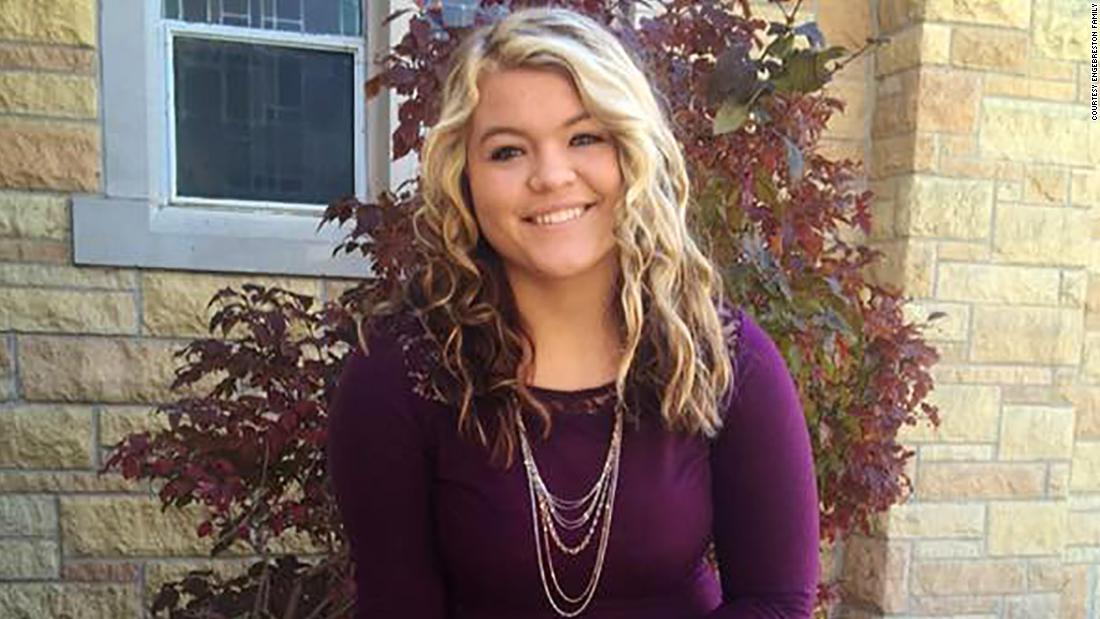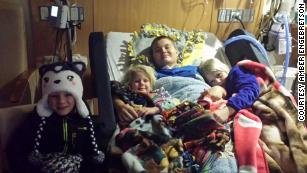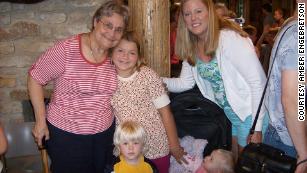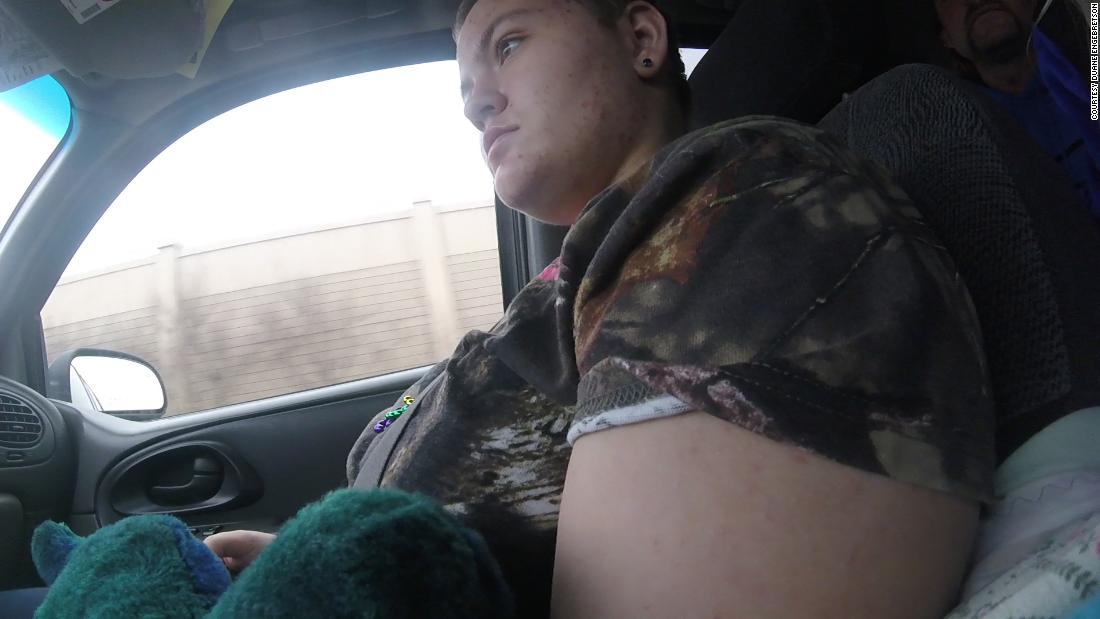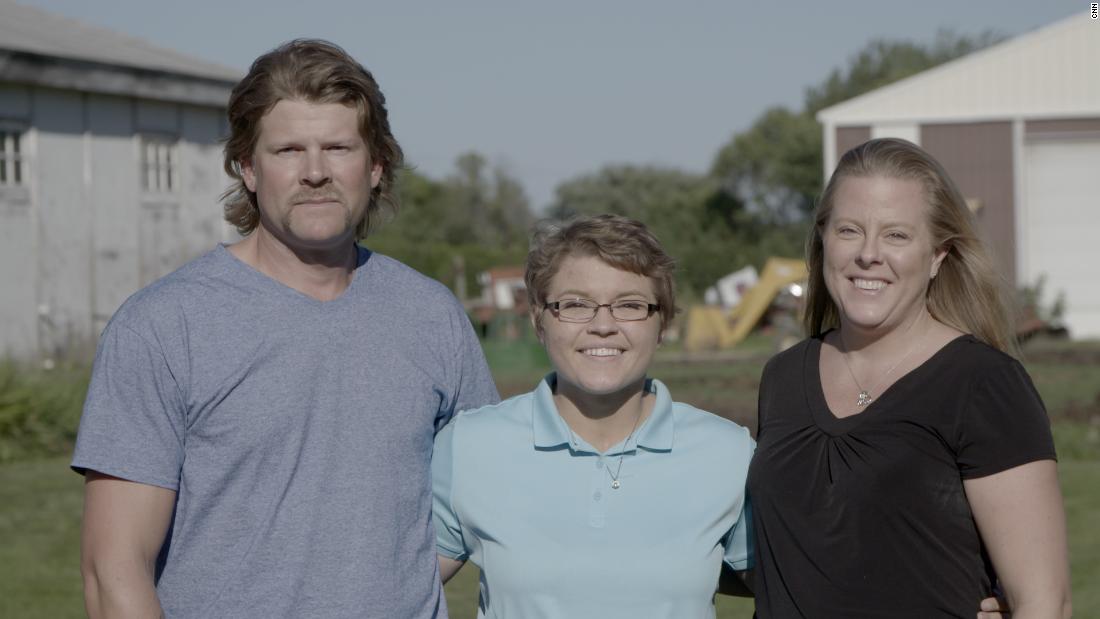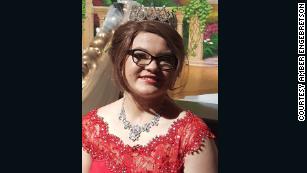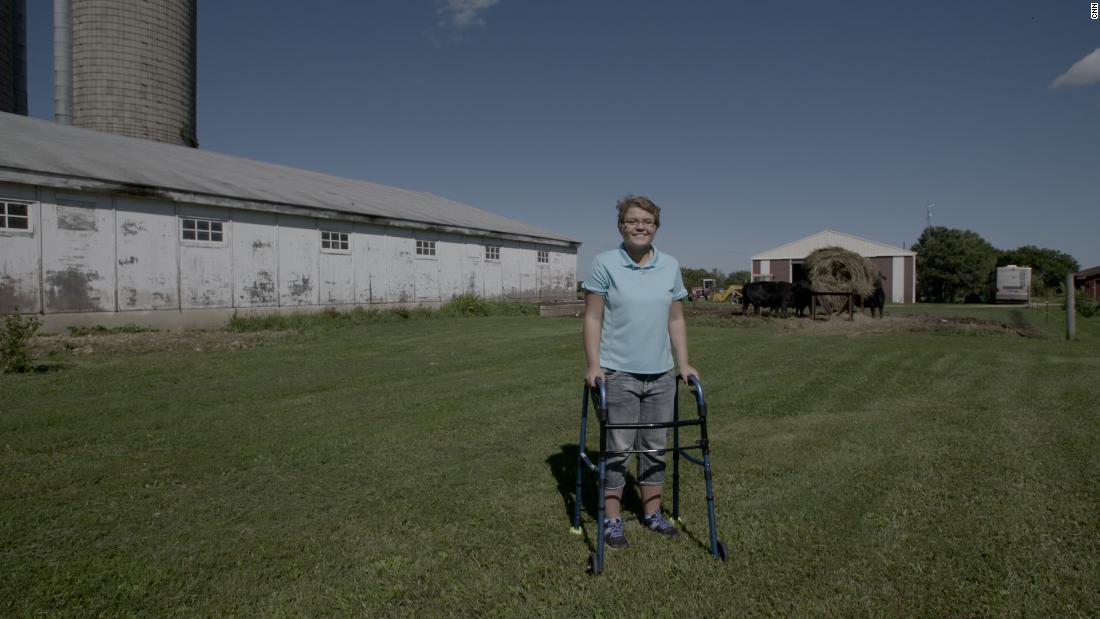In a jaw-dropping moment caught on video, an 18-year-old high school
senior rushes to escape from the hospital that saved her life and then,
she says, held her captive.
At the entrance to the world-renowned
Mayo Clinic, the young woman's stepfather helps her out of a wheelchair
and into the family car.
Staff. members come running toward him, yelling "No! No!" One of them grabs the young woman's arm.
"Get your hands off my daughter!" her stepfather yells.
The car speeds away, the stepfather and the patient inside, her mother at the wheel.
Mayo security calls 911.
"We have had a patient abduction," the security officer tells police, according to a transcript of the call.
'A cautionary tale'
The patient's name is Alyssa Gilderhus.
She and her family say
she wasn't abducted from the Mayo Clinic in February 2017; rather, she
escaped. They say the hospital was keeping her there against her will --
that Mayo "medically kidnapped" her.
Unhappy with the care she
was receiving at Mayo, they say, they repeatedly asked for her to be
transferred to another hospital. They say Mayo refused.
According
to police, Mayo officials had a different plan for Alyssa: They had
asked the county for assistance in "gaining guardianship of Alyssa," who
was an adult.
A spokeswoman for the Mayo Clinic said hospital
officials would be willing to answer CNN's questions if Alyssa signed a
privacy release form giving them permission to discuss her case publicly
with CNN. The spokeswoman, Ginger Plumbo, supplied that form to CNN.
Alyssa
signed the form, but Plumbo declined to answer CNN's questions on the
record. Instead, she provided a statement, which said in part, "We will
not address these questionable allegations or publicly share the facts
of this complex situation, because we do not believe it's in the best
interest of the patient and the family. ... Our internal review
determined that the care team's actions were true to Mayo Clinic's
primary value that the patient's needs come first. We acted in a manner
that honored that value for this patient and that also took into account
the safety and well-being of the team caring for the patient."
This
story is based on interviews with Alyssa and members of her family, a
family friend, law enforcement officials and a former member of a Mayo
Clinic board, as well as documents including law enforcement records and
Alyssa's medical records.
By everyone's account, this is an
unfortunate and devastating story about a bitter clash that went out of
control -- a clash between a Minnesota farm family and one of the
world's most revered hospitals.
"It's confusing to me why this
went off the rails so horribly," said Richard Saver, a professor at the
University of North Carolina School of Law, who at CNN's request
reviewed medical and legal documents that the family and law enforcement
officials provided to CNN.
Art Caplan, head of the Division of
Medical Ethics at the New York University School of Medicine, also
reviewed the documents, and he agrees.
"This should never have happened," he said. "This is a cautionary tale."
A Christmas Day aneurysm
The relationship between Alyssa's family and the Mayo Clinic started off well.
On
Christmas morning 2016, Alyssa settled in with a mug of hot chocolate
to open her gifts. She was surrounded by her large family: her mother,
Amber Engebretson, a stay-at-home mom; Duane Engebretson, her stepfather
since she was 4 years old, who manages a construction company and the
family's farms; and her five younger siblings, then 18 months to 11
years old.
They live in Sherburn, Minnesota, population just over
1,000 people, about 150 miles southwest of Minneapolis, on a farm with
sheep, cows, horses and pigs.
Alyssa was thrilled with her first
Christmas present: a pair of cowboy boots emblazoned with the emblem of
the Future Farmers of America, her favorite club.
Then she went to the bathroom. Her parents heard screaming.
"Mom, I need you!" Alyssa yelled as she lay curled up on the floor, vomiting.
It
was immediately obvious this was much more than just a stomach bug. Her
left side was very weak, and she couldn't hear out of her left ear.
"You could see looking at her that she was petrified," her stepfather said.
He
called an ambulance. A local hospital determined that Alyssa, who'd
always been healthy, had a ruptured brain aneurysm: A blood vessel
inside her brain had suddenly and unexpectedly burst.
Surgeons explained that her life was on the line. They drilled a hole in her skull to relieve the pressure on her brain.
A
nurse gave her parents a bag of Alyssa's hair, which had been shaved
off for the operation. Some people liked to have it, she said.
Amber
and Duane cried as they considered that this bag of hair -- their
daughter's long, beautiful hair -- might be all they had left if she
died.
They begged to have her sent to the Mayo Clinic. The main
campus for the world-renowned medical center was 85 miles away in
Rochester, Minnesota.
"They're the best. People come from all over
the world to go to Mayo," said Alyssa's mother, Amber Engebretson, who
worked as a vehicle inspector for the Minnesota State Patrol before
staying home to care for her family.
But Alyssa couldn't get to Mayo immediately. There was an ice storm. Ambulances couldn't drive, and helicopters couldn't fly.
The
weather eventually broke, and about 7 p.m. -- about nine hours after
the aneurysm -- Alyssa finally arrived by ambulance at Mayo headquarters
in Rochester.
On Christmas night, surgeons gave her a 2% chance
of living, her parents said. Doctors wrote in her medical record that
her prognosis was "grim."
Her parents reached out on Facebook for prayers. They called their daughter the #Christmasmiraclegirl.
Alyssa lived up to that name. She survived, thanks to four brain surgeries over the next month. Her doctors were ecstatic.
"They were like, she's not supposed to be here. She beat the odds," her stepfather said.
"Mayo neurosurgeons saved her life," added her mother. "We'll be grateful to them forever."
On January 30, Alyssa was transferred from the neurology unit to the rehabilitation unit.
It should have been a happy turning point. But that's when the troubles began.
Tensions flare
Although all had gone smoothly on the neurology floor, the family got into conflicts with the rehab staff almost immediately.
First,
doctors there wanted to take Alyssa off oxycodone, a powerful opioid
painkiller that the neurology doctors had prescribed for pain after
surgery. Her most recent surgery -- the fourth in one month -- had been
just a few days before.
"She'd lay in bed with tears coming out of her eyes because she was in so much pain," her stepfather said.
Many medical authorities, including the Mayo Clinic's website, say opioids are critical for post-surgical pain management.
A week after Alyssa arrived on the rehabilitation floor, her mother shared her feelings on Facebook.
"[Alyssa's] and my frustration level was high and it seems that they just don't listen sometimes," Amber wrote on February 7.
More
disputes arose. Her parents say their daughter's breathing tube was the
wrong size, and they had to pester doctors to get it corrected. They
also say the family -- not doctors -- discovered that she had a bladder
infection. They say a social worker discussed private financial
information within earshot of visiting friends and relatives.
Her parents asked for the social worker and a doctor to be replaced.
"We just need someone who will at least listen to us and hear us," Amber wrote on her Facebook page on February 20.
Alyssa's parents say that at their request, they had a meeting with her care team on February 21.
"I
had two whiteboards filled up with questions left unanswered, tests
left undone, and every other question we could think of," Amber wrote on
her Facebook page that day.
Amber says that at one point during
that meeting, she told the staff she felt like they "don't give a f***,"
later apologizing for her language. She also asked for a second doctor
to stop taking care of their daughter.
"We took no crap and laid
it all on the line. ... Because seriously what do we have to lose at
this point," Amber wrote on Facebook that night.
Mayo kicks Mom out
On February 22, the day after that meeting, Amber got into a
disagreement with a nursing aide and asked to have her removed from her
daughter's care team. She was the fourth staffer the family had asked to
be replaced in just three weeks.
That afternoon, Amber says, she
was scheduled to have a meeting with the social worker -- the same one
she'd asked to leave her daughter's care.
Amber had requested the
meeting, and she says that as she approached the office at the appointed
time, a man she'd never seen was standing in the office doorway. She
said he saw her coming and went into the office and shut the door.
Amber listened through the door. She says that as she suspected, the man and the social worker were talking about her family.
"I
proceeded to open the door and say, 'Since you're talking about my
family, I think it's only appropriate that I would be here also, to be
included in the conversation,' " she remembers.
She says the man
puffed out his chest and stepped toward her, and she took a backward
step into the hall. The man, who Amber later learned was a physician,
demanded that she leave.
She says the man told her, "I run this whole rehab unit. Do you understand me?"
Amber describes the doctor as "intensely aggressive."
She replied to him, she says, with similar aggression and frustration: "I need to talk to you. Do you understand me?"
The doctor walked away.
CNN reached out to this doctor and other staff members involved in Alyssa's care but did not receive responses.
About
an hour later, Alyssa's parents say, the same doctor, the social worker
and a nurse approached the family. They were accompanied by three
security guards.
"[The doctor] said to me, 'You are not allowed to
participate in Alyssa's care. You are not allowed on Mayo property. You
will be escorted off the premises right now,' " Amber remembers.
Amber and Duane say they asked why Amber was being kicked out but did not receive an answer.
Later,
a social worker would tell police that "Amber interrupted a meeting
because Amber was upset over the care Alyssa was receiving. Due to that
incident, Amber was escorted off of [Mayo] property."
According to
Alyssa's parents, the doctor told Duane that he could stay but that he
would not be allowed to have any involvement in his stepdaughter's care.
The couple say they asked the doctor whether they could speak with a patient advocate.
"He said, 'There is no patient advocate,' and walked away," Amber said.
When asked about Amber's dismissal from the hospital, Mayo spokeswoman Plumbo sent CNN a statement.
"Our
care teams act in the best interests of our patients. As a general
practice, this includes sharing information with family members and
facilitating family visits and interactions with patients and their care
providers when the patient is in our care. However, in situations where
care may be compromised or the safety and security of our staff are
potentially at risk, the family members' ability to be present in the
hospital may be restricted."
Plumbo did not elaborate on whether or how Amber compromised her daughter's care or placed staff at risk.
"We would never compromise her care," Amber said. "She's our daughter. We love her."
She also says she never put staff members at risk. "We would never do that -- ever," she said.
On February 23, the day after Amber was kicked out, she went on Facebook.
"PRAYER
WARRIORS UNITE!!!! We need your help. ... Please READ THIS AND SHARE
THIS POST in hopes it reaches the people or person who can help us," she
wrote.
"I HAVE BEEN TOLD I AM NOT ALLOWED IN ALYSSA'S ROOM AND NO
ONE IS ALLOWED TO HAVE ANY SAY OR PARTICIPATE IN HER [CARE]. ... I AM
NOT ALLOWED TO SEE HER!! We have been given no reason why, no paperwork,
and no explanations," she continued. "I never imagined something like
this could happen in our world and a very hard situation already has
been made even harder!!"
The response from one Facebook user led the family to conclude that they needed to get Alyssa out of Mayo, and fast.
'Basically a prisoner at Mayo'
Alyssa, who was legally an adult during her entire hospitalization,
says that around this time, she started asking doctors and nurses to
transfer her to another facility.
She says she never received a response.
"They were cruel to me," Alyssa said, adding that she wanted to get out of Mayo "as bad as possible."
On February 23, three weeks into her daughter's stay in rehab, Amber complained on Facebook, tagging Mayo.
"They
refuse to let her go. ... We cannot transfer [Alyssa] out or get her
discharged," she wrote. "No one has any say in [Alyssa's care] and she
is basically a prisoner of Mayo."
Alyssa's stepfather and grandmother say they also asked to have her transferred out of Mayo.
"I asked two to three times a day, and it would go nowhere," Duane said.
"Duane
said, 'This is ridiculous. We don't want her here; Alyssa doesn't want
to be here; she doesn't feel safe here,' " her grandmother Aimee Olson
remembers. "But there was no response."
Duane says he tried to
talk to a senior doctor on the rehab staff about a transfer. It was the
same doctor who had asked his wife to leave the hospital.
"He said
'I have nothing to say to you. This is a legal problem,' " Duane
remembers. "I even asked him, 'can I speak to your supervisor, your
boss,' and his exact words were 'I run this whole floor,' and [he]
turned around and walked out of the room, and that was it.'
Duane
says he called the Mayo Patient Experience office and in a 45-minute
phone call described the family's grievances. He said the patient
experience specialist told him he would be back in touch after getting
Mayo's side of the story.
Olson, Alyssa's grandmother and Amber's
mother, said she also tried to speak with the senior doctor but was told
he wasn't available.
"She was truly being held captive," Olson said. "I would never believe a hospital could do that -- never in my wildest dreams."
The family and a friend say they were instructed by Mayo staff not to talk to Alyssa about her mother.
Two nurses were assigned to be with Alyssa, and they kept careful watch, according to visitors.
"It
was like they were watching every move you made," said Joy Schmitt,
Alyssa's boyfriend's mother, who visited frequently after Amber was
asked to leave the hospital.
'They were taking over our daughter'
On February 21, the day before her mother was kicked out of the
hospital, a Mayo psychiatrist examined Alyssa and found that she lacked
the capacity to make her own medical decisions, according to a summary
of her care that her doctors wrote after she left Mayo.
Around
this time, a hospital social worker went to adult protection services in
two counties to try to get those authorities to get guardianship over
Alyssa, according to the police. If they had succeeded, she would have
become a ward of the state.
Alyssa and her family say that they
weren't told any of this as it was happening but that around this time,
they started to feel that Mayo was isolating Alyssa.
On February
26, staffers confiscated Alyssa's cell phone, laptop and tablet after
finding that she'd made a video for her mother, according to Alyssa and
her family. They say Alyssa's visitors were also banned from bringing
their devices into the hospital.
The same day, Mayo staffers said
no one would be allowed to stay overnight with Alyssa, according to
Duane and Amber's sister, April Chance, who attended a meeting with
Alyssa's care team.
Duane says he asked the staff to reconsider.
He said his stepdaughter had never spent the night alone in the
hospital. But he says they refused.
"The doctors said they were doing this for Alyssa's own benefit," Duane said.
The
family says the doctors also told them that visitors would no longer be
allowed to attend Alyssa's treatment sessions, such as physical and
occupational therapy.
"I said, 'We're her cheerleaders. We cheer her on,' " her aunt remembers. "And they said 'No, you're impeding her care.' "
She said the staff didn't elaborate on how they were impeding her care.
"They were restricting us little by little from even being with Alyssa. They were taking over our daughter," Duane said.
Mayo also pushed back Alyssa's discharge date, which was supposed to be February 27.
Meanwhile, her mother's following was growing on Facebook, with many users posting angry messages that tagged Mayo.
One woman sent Amber links to stories about a teenager named Justina Pelletier.
Articles in
The Boston Globe
and elsewhere described how in 2013, Pelletier, then 14 years old, was
placed in state custody for nearly 16 months after Boston Children's
Hospital accused her parents of interfering in her care. She spent much
of that time in a psychiatric ward.
Amber says she spoke on the
phone with Justina's parents, Linda and Lou Pelletier. She says they
warned her there would be signs that the hospital was seeking
guardianship for their daughter. They would keep a tight watch over her
and limit her communications with her family.
Through their lawyer, John T. Martin, the Pelletiers confirmed that they had conversations with Amber.
A
spokeswoman for Boston Children's Hospital told CNN that the hospital
is "committed to the best interest of our patients' health and
well-being" and declined to discuss the specifics of the case.
Amber sent a text to the woman who'd sent her the news articles.
"OMG I am SICK. This is what is happening," Amber wrote. "It rings lots and lots of bells. ... Omg ... I am so scared."
A Mayo board member steps in
Alyssa's parents reached out to a friend of a friend for help: Mark
Gaalswyk, who at the time was a member of the board of directors for the
Mayo Clinic Health System in Fairmont, Minnesota.
Gaalswyk emailed a Mayo Clinic vice president. He informed her of the situation and explained that CNN had contacted the family.
"Could
you please please do what you can to get your arms around the
[situation] immediately?!" he wrote. "Please get to the bottom of this
quickly before it blows up even more."
But Gaalswyk's pull wasn't enough.
He says Mayo treated Alyssa "terribly."
"I'm
probably the most pro-Mayo person who has walked the face of this
earth," said Gaalswyk, who left the board January 1. "But this was a
mess."
He said he thinks Amber probably "used words she shouldn't have" with hospital staff.
"I'm not saying that Amber is 100 percent in the right," he added, "but I know what Mayo did is not OK at all."
In
its statement to CNN, the Mayo spokeswoman said that "Mayo Clinic is
committed to the safety and wellbeing of all the patients we treat."
Feeling
like they were running out of options, Alyssa's parents then enlisted
the help of Karie Rego, an attorney and patient advocate they'd met on
Facebook.
On February 27, Rego spoke on the phone with Joshua
Murphy, Mayo's chief legal officer, and faxed him a letter urging Mayo
to transfer Alyssa to another facility.
"Given what has happened here, an expedited transfer this coming week would be best for everyone," she wrote.
Rego
says an attorney in Murphy's office called her later. She says that he
told her he couldn't speak with her and that she never heard anything
more from Mayo's legal department.
That night, Alyssa's parents thought about Justina Pelletier and the 16 months she spent in state custody.
They went online and printed a form for Alyssa to sign, saying she was leaving the hospital against medical advice.
But her parents didn't know how they would get her out. Two nurses were assigned to keep watch over her at all times.
They started to hatch a plan to get her out of Mayo the very next day.
Full Article & Source:
Escape from the Mayo Clinic: Teen accuses world-famous hospital of 'medical kidnapping'













